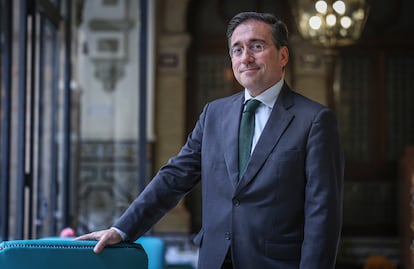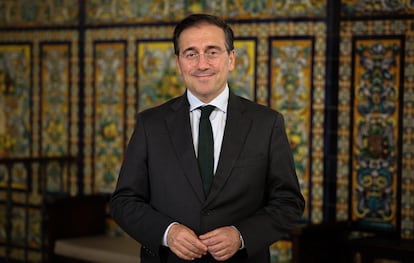José Manuel Albares: “Multilateralism is being challenged, but that doesn't mean we have to give up.”

Dozens of heads of state and government have descended on Seville these days, transformed into a fortress city for the 4th United Nations Conference on Financing for Development . The event aims to make the world habitable for the millions of people in the Global South living in countries suffocated by the intersecting crises of COVID-19, the war in Ukraine, rising interest rates, the climate emergency, and now foreign aid cuts.
For Spanish Foreign Minister José Manuel Albares (Madrid, 53), this summit represents a triumph of multilateralism. Despite the current global disorder, or perhaps precisely because of it, the international community continues to want to cooperate and solve global problems together. "Multilateralism is being questioned, but that doesn't mean we have to give up," says Albares, referring to aid cuts from the United States , the world's largest donor and the notable absentee at this meeting, which also distanced itself from the summit's final text.
Question: The world is in flames, and the law of the strongest prevails. Does it make sense to talk about development financing in Seville when countries like the US, Russia, and China are imposing a transactional system, which is also gaining followers in the Global South ?
Answer: It makes more sense than ever, because this is the time to defend, on the one hand, multilateralism and, on the other, development cooperation. Not even the most powerful state in the world can solve the planet's major existential problems alone. There can only be a joint, multilateral, cooperative solution. The fight against climate change, against pandemics, the management of migration flows... Development financing, which is the issue that brings us here, can only have a solution on a global scale. This is a summit of alliances. Between North and South, between the private and the public. It is a watershed. Here we will see who believes it is possible to move forward together and who throws in the towel.
Q. You're referring to the US, the notable absentee at this summit. Is it possible to move forward without the world's largest donor, without a key player in the debt issue?
A. The commitment in Seville demonstrates that progress is possible. Spain is currently at the forefront, serving as a bridge between Europe and the countries of the South. This is the first time that a conference of this type has been held in a developed country, and this demonstrates the commitment to multilateralism. Cooperation is always much stronger than confrontation, and in Seville, we will put truly innovative ideas on the table. The emphasis is on debt. There are 3.4 billion people living in countries that spend more on debt than on health or education. That's why a debt moratorium will be introduced for when humanitarian and environmental disasters occur, or when there is war.
It's a watershed. Here we'll see who believes it's possible to move forward together and who throws in the towel.
Q. Both the US and major European donors have cut their development aid.
A. Development cooperation is currently declining. In Spain, however, it grew by 12% last year. It's absolutely necessary if we want to prevent, for example, a disease like AIDS from returning to standards that are unacceptable today. We can't allow pandemics or endemic diseases to continue to grow.
Q. This summit is focused on the Global South, but many African countries have stopped considering the West a reliable partner. They felt abandoned, first during COVID and now with aid cuts. They're looking to Russia, China, the Gulf. Can the West regain that credibility?
A. We are a completely reliable partner, and our credibility has grown because of our defense of the UN and international law. It has grown because we hold the same views in both Kyiv and Gaza, for the same reasons. We are countries that believe in those values, in the UN, in international humanitarian law, in the unacceptability of underdevelopment, the lack of education, and disease.
Q. But those consensuses are broken.
A. It's time to defend ourselves even more vigorously. The consensus hasn't been broken. There's still no unilateral alternative to climate change or to managing migration flows with respect for human rights. War can't be a way for states to relate to each other, as we see in Ukraine or the Middle East. Multilateralism is being challenged, but that doesn't mean we have to give up.
Q. The Seville commitment is not binding. It's a consensus text, with the US absent. What makes you think it won't remain a dead letter as it has on other occasions? Some of the commitments from the previous Addis Ababa summit have not been met.
A. When states commit to something, they tend to fulfill it. And this isn't an easy time to commit to these things, which is why it has a doubly significant value. It's a true roadmap for the coming years.
Q. Spain has committed to reaching 0.7% of GDP in development aid by 2030, but it's stuck at 0.25%. How do you plan to achieve this? It doesn't seem very realistic.
A. We found cooperation at one of its lowest points in its history when Pedro Sánchez came to power. In 2015, we were at 0.15% of GDP, and by 2024, we'd increased it to €4 billion, a 12% increase. It's a historic figure, and from there, a growth path will be established. For the first time in Spain's history, the 0.7% is reflected in a law.
Q: Yes, but how do you get there? There are only five years left.
A. We're waiting for the new budgets, but the commitment is there.
Q. Some European countries are cutting back to meet military spending targets. Will Spain cut back?
A. Of course not. Spain is not going to cut development aid.

Q. Speaking of military spending, Spain stood alone at the last NATO summit in rejecting the 5% threshold. Aren't you afraid of leaving Spain isolated?
A. Absolutely not. Spain is a reliable ally committed to Euro-Atlantic and European security. We have maintained a different view from the outset, and what we believed was that the debate had to pivot around capabilities, and to achieve those capabilities, we believe 2.1% is sufficient. We attended the last NATO summit with the spirit of a reliable ally. And, of course, we are a pillar of support for the United Nations, international law, and international humanitarian law wherever we are, whether in Kiev or Gaza.
Q. In Gaza in particular, it is in tatters. International law is being destroyed right before our eyes. How is it possible that diplomacy is unable to prevent this?
A. Spain has not stopped denouncing this for a single moment. Spain is the country that has done the most for the Palestinian people, for the innocent civilians in Gaza. And for never giving up and resigning itself to war being the natural way of relating between the peoples of the Middle East.
Q. Are Spain's relations with Israel irreconcilable?
A. We condemn the terrorist attack by the Hamas terrorist organization. We have supported all the sanctions packages against Hamas. Of course, the State of Israel not only has the right to its existence, but also to its security. But we say with the same force that the Palestinian people also have this right, exactly the same right to a state and a state in peace and security. And we all know the ultimate formula for peace between Israelis and Palestinians: a Palestinian state and an Israeli state living side by side in good neighborliness and guaranteeing mutual security.
Q. With more than half a million settlers living in the West Bank, it's impossible to imagine a Palestinian state. Right now, they're more like Bantustans, like in apartheid South Africa.
A. Spain is in favor of sanctioning violent settlers and anyone who wants to undermine the two-state solution. We already have a list and have also requested it within the European Union.
Spain is in favor of sanctioning violent settlers and anyone who wants to undermine the two-state solution.
Q. Spain is arriving at the summit in a situation of enormous internal political instability following the revelation of an alleged corruption scheme within the governing party. To what extent is Spain's credibility as an international player in question?
A. In recent years, Spain has experienced the greatest international presence and prestige in its entire democratic history. Today, Seville is the world capital of multilateralism, the center of the UN. In the last three years alone, Spain has hosted a NATO summit, and has been the President of the European Council, which achieved a historic CELAC [Community of Latin American and Caribbean States] Summit. Spain has never held the first vice-presidency of the European Commission. We have the President of the European Investment Bank, and until recently, it held the High Representative, and next year it will host the Ibero-American Summit.
Q. I'm referring specifically to the current situation, to the corruption scandal affecting the government, to the calls for early elections. Aren't you worried about how this could affect the international scene?
A. Our international presence is very clear, and everyone recognizes it. Our Arab friends recognize us, and they believe Spain is saving Europe's dignity. UN Secretary-General António Guterres emphasizes Spain's absolutely vital role at this time in building a bridge between North and South, in ensuring that a conference like this can take place. This presence has been present for several years now, and it continues to be present.

EL PAÍS





